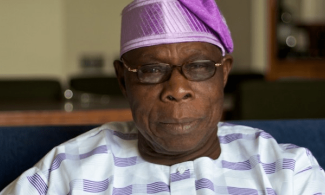
The former presidents, who met in Abeokuta, Ogun State, included Chief Olusegun Obasanjo (Nigeria); John Mahama (Ghana); Ernest Koroma (Sierra Leone) and Raila Odinga (Kenya). The immediate past Chairman of the Independent National Electoral Commission (INEC), Professor Attahiru Jega, was also in attendance.

Former presidents of four African countries yesterday opened discussion on how to find a lasting solution to disruptive use of Information and Communication Technology (ICT) on electoral process on the continent.
They also met to propose models of successful deployment of ICT in electoral systems in Africa for the sustenance of democracy.
The former presidents, who met in Abeokuta, Ogun State, included Chief Olusegun Obasanjo (Nigeria); John Mahama (Ghana); Ernest Koroma (Sierra Leone) and Raila Odinga (Kenya).
It was at the opening of a two-day high-level working group meeting on “Mitigating Disruptive Applications of Information and Communication Technology (ICT) on the Electoral Process in Africa.”
The immediate past Chairman of the Independent National Electoral Commission (INEC), Professor Attahiru Jega, was also in attendance.
In his opening remarks, Obasanjo said though ICT has come to stay, it could be a good servant or bad master in the conduct of elections.
The former president, who chaired the event, explained that the essence of the meeting was to review electoral systems in Africa, especially inputs, processes and outcomes.
He added that the meeting was also to examine the strengths and weaknesses in the use of ICT in electoral systems in Africa and elsewhere in the world.
Among other objectives, Obasanjo noted that the meeting would explore how ICT could be used to ease the electoral process rather than inhibit it.
He pointed out that it was also to document good practices in e-voting across the world and extract lessons for Africa.
Obasanjo expressed hope that the outcomes of the deliberations would have far-reaching implications for the quality and credibility of the election firmament in Africa.
He said:”About three weeks ago, the Africa Progress Group (APG) which I chair was formally inaugurated and we are delighted that the Secretariat of APG is the venue of this important meeting which has to do with the progress of Africa.
“One of the pillars of Africa’s progress in my five ‘P’s as adopted by APG at its inaugural meeting of November 27, 2018 is Politics; the others are Prosperity, Population, Protection and Partnerships.
“This meeting on the election process is within the framework of the pillar of politics. Deficit in the election process will translate to deficit in politics (and vice versa) which in turn will impede sound governance, a much sought-after element in the development of Africa.
“During the course of this meeting, we will be addressing one of the key issues that is at the heart of credible elections in Africa – Information and Communication Technology (ICT) and the election process.
“ICT is here to stay, pervading and increasingly impacting all aspects of our lives, including the conduct of elections. But it can be a good servant or a bad master. This is why, I believe, that the outcomes of our deliberations will have far-reaching implications for the quality and credibility of the election firmament in Africa now and in the future.
“It is a subject that has engaged the attention of numerous regional and global organisations, including the African Union. This meeting presents an important addition to those previous efforts. More than an addition, our meeting hopefully will present new and refreshing insights to how ICT can be better used in delivering credible elections in Africa and for the rest of the world.”
Delivering a paper titled, “Practical Experience in the use of ICT in the Election Process in Africa: The Nigerian Experience,” Jega stated that two essential areas that technology has not yet been fully utilized are the electronic collation and transmission of results as well as electronic voting.
The former INEC boss said the use of appropriate technology would go a long way to improving the efficiency of the conduct of elections, as well the integrity of elections.
He said:”Opportunities need to be explored and adequately utilised. But, we must constantly remember that use of ICT in elections is a means to an end, and not an end in itself.
“That end, perhaps, is electoral integrity for deepening and consolidating democracy. We need to constantly deploy measures that can ensure secure and sustainable use of ICTs in our electoral processes.”